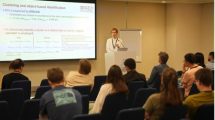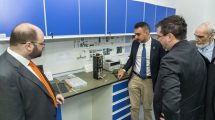
What does your role at the Egyptian Space Agency entail?
As the Egyptian Space Agency (EgSA) CEO, I am responsible for steering our nation’s space endeavours towards innovation and excellence. My role encompasses overseeing EgSA’s strategic vision, ensuring the development and localisation of space technology and fostering international collaborations. We aim to position Egypt as a leader in space technology within the region, contributing significantly to the country’s sustainable development goals.
You recently announced three significant satellite projects on which Egypt is taking the lead — the African Development Satellite, the partnership with UNOOSA and Airbus and SPINX. Could you elaborate on each of these projects and Egypt’s technical role in them?
The African Development Satellite project involves collaborating with five African Countries — Kenya, Ghana, Uganda, Nigeria and South Sudan. The satellite studies climate change, marking a significant step in Egypt’s leadership in African partnerships.
The design, assembly and testing are all conducted at our facilities in Egyptian Space City, where we leverage our advanced capabilities in satellite technology localisation.
Regarding our partnership with UNOOSA and Airbus, this underscores our commitment to international cooperation in space technology. It aims to enhance our technical capabilities and knowledge transfer in satellite technology. We provide infrastructure for the design, assembly, integration and testing, thereby ensuring high performance and reliability standards.
Our SPINX initiative fosters innovation in space technology through research and development. It aims to create a hub for space technology startups and entrepreneurs within Egyptian Space City, providing them with state-of-the-art facilities and technical support.
Could you tell us more about the current capabilities of Egyptian Space Agency, the infrastructure and facilities you have and what kind of components you are now able to build locally within Egypt?
Egyptian Space Agency is headquartered in Egyptian Space City, located near the New Administrative Capital. Spanning 123 acres, this city is a hub for all space-related activities, hosting research labs, assembly and integration facilities, and the headquarters of the African Space Agency. We employ diverse engineers, scientists, and technical experts to advance our space technology capabilities.
Our facilities include one of the largest assemblies, integration, and testing centres in the Middle East and Africa, a concurrent design facility, and specialised testing and characterisation labs. We have successfully localised significant portions of satellite technology, achieving up to 60% in nanosatellites, 40% in microsatellites and 15% in minisatellites.

Could you share any updates or progress on your two recent space missions, NexSat 1 and MisrSat 2?
NexSat 1 was launched from China on February 3. It focuses on climate studies in collaboration with the Academy of Scientific Research. It has achieved a 35% localisation rate. Initial operations were conducted by our German partners and later transitioned to Egyptian control.
MisrSat 2 was launched on December 4 last year. It is operating efficiently, capturing images, and undergoing rigorous testing. It provides comprehensive scans of Egypt, contributing to our sustainable development goals. MisrSat 2 represents a significant milestone in our efforts to localise satellite technology, having been entirely tested within our assembly centre.
Are there any more launches in the pipeline in the next couple of years?
Yes, we have several projects in the pipeline. Our focus remains on completing the localisation of satellite technology that serves Egypt’s sustainable development goals.
We are also exploring opportunities to expand our satellite constellation, enhance our Remote-sensing capabilities and strengthen our international collaborations.
“The design, assembly and testing are all conducted at our facilities in Egyptian Space City, where we leverage our advanced capabilities in satellite technology localisation” Dr. Sherif Sedky, CEO, Egyptian Space Agency
Please tell us about New Space Horizons Conference agenda for this year?
This year, the agenda focuses on emerging technologies, international collaboration and the commercialisation of space. We aim to bring together experts, policymakers and industry leaders to discuss advancements and opportunities in space exploration and technology.
What are some key priorities for Egyptian Space Agency in the coming years, and how are you forging ahead with them through partnerships?
Our key priorities include advancing satellite technology localisation, enhancing our research and development capabilities and fostering international partnerships. We are actively collaborating with various countries and organisations to share knowledge and resources, ensuring we remain at the forefront of space technology innovation.

What do you foresee as the current challenges within Egypt and the regional space sector, and how are your initiatives aiming to address them?
One of the main challenges is the high cost of space technology development and the need for specialised skills. To address this, we are investing in capacity building through our Space Academy, which offers training and education programmes. Additionally, we are working on securing funds and fostering international collaborations to share the financial and technical burden.
How does the Egyptian Space Agency leverage satellite technology for societal and environmental benefits?
We utilise satellite technology to monitor agriculture, water resources, and urban development, providing crucial data for decision-making. Our satellites also contribute to climate studies and disaster management, helping to mitigate environmental impacts and support sustainable development initiatives.
How does the Egyptian Space Agency promote STEM education and inspire the younger generation to pursue careers in space and science?
We have established the Space Academy, which offers educational programmes for school and university students. These programmes include hands-on training, workshops and collaborations with universities to develop curricula that support our space programme objectives. We aim to inspire and equip the younger generation with the knowledge and skills needed to contribute to the space sector.
I want to emphasise our commitment to regional cooperation and space technology development in Africa. As the headquarters of the African Space Agency, we are dedicated to advancing space science and technology across the continent, fostering collaboration, and sharing our expertise to address common challenges and achieve shared goals.














Add Comment